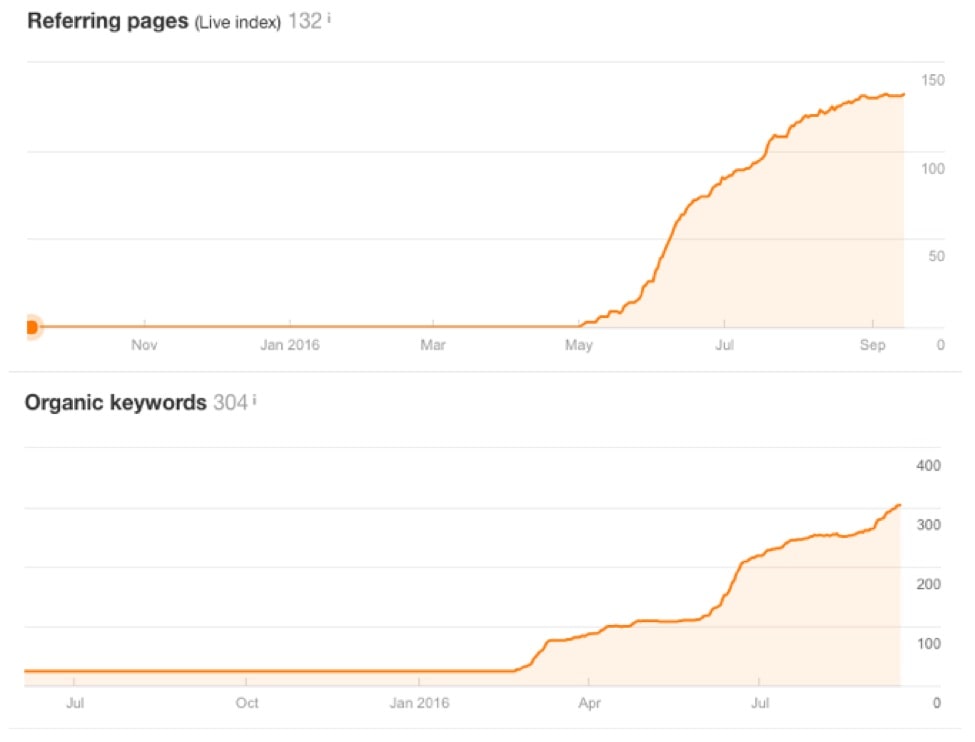You read the obituaries for guest posting every so often. People say guest posting is dead, guest posting isn’t effective, and you should stop doing it. I can say from first-hand experience that guest posting is — without a doubt — the most effective strategy I’ve seen for growing organic traffic, especially if your content doesn’t have a wide appeal.
To sum up the strategy, the idea is to:
- Post content that’s highly-targeted on your blog
- Build relationships with other, loosely-related blogs
- Write broadly appealing content for those blogs
- Link back to your niche content to get it ranking highly in Google
I’m not going to lie … it’s a lot of work.
There’s a ton of communication in the background you don’t expect. There’s work getting sent back for edits, rejections, and re-writes. But it’s all worth it!
As far as I’m concerned, there’s not a more consistent way to generate high-quality backlinks and referral traffic. And in this post, I’m going to break down the system I use — the system you can use, too.
Writing high-value niche content
Whether you’re selling a product or a service, there is an audience out there somewhere. There’s a niche group of people, and they’re searching for content to help them out with a problem. These people don’t know that your product or service is a great fit for them, but they’ll hear it about through your content — as long as it’s seen.
The first step to getting it seen, obviously, is to write it. But what do you write about? If you had an eCommerce store selling rare DVDs and video tapes to select collectors, you’d probably write content reviewing the movies and discussing the themes, using terms they’re likely to be searching for in Google.
If you’re not personally a member of your niche, and wouldn’t necessarily be the ideal customer for the product/service, then you need to find where your audience is hanging out (reddit is a great choice), see what they’re talking about and then use a keyword tool like Ahrefs’ Keywords Explorer to generate suggestions.
There’s a lot of nonsense out there about this, but really you just need to find the place your market is hanging out, then use a solid keyword research process like this to spin off a list of related keywords to target.
Starting with a list of keywords makes it much easier to write the content. The keyword will form the main part of the title, so after that you just need to jazz it up a bit.
To see what you’re up against, Google the target keyword. If the first page is filled with PDF files, low value content, and shows things that don’t even target the keyword, you’re in for an easy time to get targeted traffic back to your site. If they’re not, then you’ve just got more promotion work to do.
Make sure you follow a guide like this one from Kissmetrics to make your content effective, and link the concept of the content back to your product or service. You can always go back and create a more effective call to action if and when the content starts ranking and bringing in traffic organically.
Building relationships with other blogs
Just like real life relationships, you often need several ‘touch points’ before you start getting a good response. An in-person meeting, a comment conversation, a quick chat on Twitter or some personalized email outreach does the trick. The busier the person, the more touch points (instances of communication) you’ll need before you start getting recognized.
You need to show you’re giving value up front. I usually start with the lists of places I’ve been published, like TechCrunch, and send over a list of titles. If it’s a super-busy journalist, I’ll have to lay the groundwork first: interact on Twitter, send a few follow-up emails, etc.
The hardest part of this is realizing that everyone else is a human being exactly like you are. We’re not so different. We all want to be great at our jobs, help our business succeed and provide value for our audience. When you realize that, it all starts getting a little easier.
While it might not sound like a the most organic way of building relationships, it is best to create a list of people you want to get to know and go through it on a regular basis, contacting them. Apply sales methodology to your marketing relationships and use a CRM like Close.io to tag and sort your contacts and alert you when it’s time to follow up.
To find your initial list of people to contact, it’s best to first draw on the places you already know. You probably have a list of blogs you read regularly, or publications you turn to for a few articles to read on your lunch break. If you’re coming up short, search a broad keyword on a topic you have lots of ideas for in BuzzSumo, and export the list to get URLs of blogs with popular, interesting content.
A quick monthly checklist for warming up relationships with editors:
- Commented on three blog posts
- Replied to two tweeted articles
- Tweeted at twice
- Sent one email
Writing and pitching broadly appealing content
The trick to effective guest posting is being able to write in a way that satisfies the blog and lets you get relevant links in. The more niche the content, the more difficult it’ll be, but it’s definitely a learned skill and something that helps you write less spammy content when you do learn it.
Think about it this way: if your niche content was interesting enough, you wouldn’t need to guest post so hard to get backlinks to it. Some shareable content takes off on its own and grabs backlinks so effortlessly you wonder why you ever worked so much!
For examples of broadly appealing content, check something like Alltop, the homepage of Inc, or highly rated content on Inbound.org. Is any of that about your shower cleaning service? I thought not!
Making the pitch
It’s best to brainstorm a list of titles that are in key with the blog you’re writing the pitch email to before you start writing anything. They’re bound to have a favorite from the list, and that’ll stop you from wasting time. If you’re struggling to get a response and need a reason to follow up with something valuable, you can always write a piece up and paste it into the email so they can see you mean business.
Emails should follow logical structure:
- Greeting
- Pleasantry
- How you got their details, call back and reason for email
- Topic (reason for email)
- Situation
- Benefits
- Call to Action / the ‘ask’
- Closing line
- Signature
What this could look like in practice, is this:
Hi, Dave!
Hope you’re getting on alright, and the weather’s a little better than it is here.
I found your email address while searching around for who to contact for guest contributions at MadeUpMarketingBlog.
I was hoping I could get your opinion on a few titles I’d like to write up for submission? My content has generated thousands of shares on sites like Forbes and Fast Company before, so I think your audience would really get something out of it.
[Titles]
Let me know what you think, and if you’d like me to draft anything up.
Thanks!
Benjamin
Once you’ve gotten replies, it’s time to go through their editorial process by writing and editing the content.
Including non-spammy links and helping to promote the posts
One of the main things other blogs can leverage with guest writers is their promotion network. This is because all writers are really keen to promote their own work! We run the same promotion process on posts that link back to us as we do with posts on our own site. This means posting on social bookmarking sites, sharing on social media, and linking back religiously in future posts.
The reason why our guest posts don’t come across like blatant pitches for our product is because they simply are not. They include one or two links back to our past content and content that mentions us around the web. It’s a basic SEO good practice to include outbound links in your articles that lead to high quality content, so there’s not often any reason for site owners to take offence at that.
When the post goes live on the other person’s blog, make sure to watch for it and start promoting it straight away. Leave a comment to thank the blog for accepting your submission, and be generous about linking back to the post to improve the blog’s domain authority, both as a way to say thank-you and as something that benefits you.
The results of this process
This process is something we’ve been doing for around 4 months at this point. When we started, we’d gotten 9 backlinks to our target post, and it was ranking poorly for the keywords we targeted.
Now here’s what it looks like:
And what that looks like in real terms for our business, is thousands of new leads every month from one piece of niche content and 4 months of guest posting.
Don’t let anyone tell you guest posting is dead.






Great read! Thanks for mentioning Close.io in here 🙂
I came across your site while researching on outreach and this information is still relevant today and really informative article.